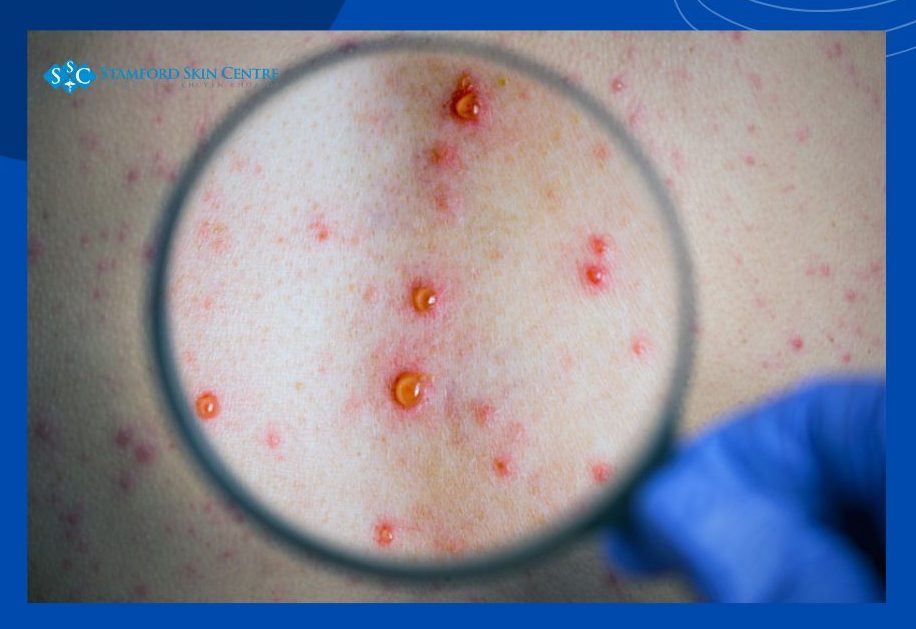
What is syphilis?
- Syphilis is a sexually transmitted infection (STI) caused by the spirochete Treponema pallidum. If left untreated, it can cause serious and potentially life-threatening problems.
- Many people are infected but don’t know because they don’t have any symptoms.

Syphilis
How is syphilis spread?
- You can get syphilis by having sex with someone who has it. “Having sex” means having oral, anal, or vaginal contact.
- You can get syphilis when your mouth, genitals, or another part of your body touches a syphilis sore on a person who has the disease.
- If you are pregnant, you can pass syphilis on to your baby.
What are the symptoms of syphilis?
- Primary stage symptoms:
The first or primary sign of syphilis is usually one or more painless sores on the genitals or in the mouth, anus, or rectum and may be accompanied by swollen glands. The name for this type of sore is a chancre. The sore is likely to be wherever you had sex. If you had oral sex, it might be in your mouth or on your genitals. The sore may last from one to five weeks, and may disappear by itself even if no treatment is received. If you don’t get treatment, the disease will progress to the next stage.
- Secondary stage symptoms:
Approximately six weeks after the sore first appears, a person will enter the second stage of the disease. The most common symptom during this stage is a rash, which may appear on any part of the body including trunk, arms, legs, palms, soles, etc. – this is not usually itchy.
Other symptoms may occur such as tiredness, fever, sore throat, headaches, moth-eaten alopecia and swollen glands. These symptoms will last two to six weeks and may go away on their own. If you don’t get treatment, the disease will progress to the next stage.
- Latent syphilis
When the symptoms of secondary syphilis disappear, the disease enters the latent, or hidden, stage. There are no symptoms, but the person is still infected. If syphilis is not treated at this stage it may remain latent for life, or it can develop into tertiary syphilis.
- Tertiary syphilis
Tertiary syphilis develops in about 15% to 30% of people who have not been treated and can appear up to 30 years after infection was first acquired. In this stage, the disease may involve the brain, nerves, eyes, heart, blood vessels, spinal cord, liver, bones, and joints and can be fatal. Symptoms of tertiary syphilis vary depending on the organ system affected.
How soon do symptoms appear? : Symptoms can appear from 10 to 90 days after a person becomes infected. They are often not noticed or are thought to be minor abrasions or heat rash.
Testing for syphilis
It can take up to 12 weeks from the time you’re exposed to syphilis for blood tests to show the infection. Besides, blood tests can detect the bacteria within 1–2 weeks after the chancre appears
Can I get syphilis again, after receiving treatment?
Having syphilis once does not protect you from getting it again. Even after successful treatment, you can get syphilis again.
What is the treatment for syphilis?
Syphilis is treated with penicillin. The amount of treatment depends on the stage of syphilis the patient is in. A baby born with the disease needs daily penicillin treatment for 10 days.
What are the complications associated with syphilis?
- Untreated syphilis can lead to destruction of soft tissue and bone, blindness, deafness and a variety of other conditions which may be mild to incapacitating. More important, a female with untreated syphilis may transmit the disease to her unborn child, which may result in death or deformity of the child.
- Physicians are required to test pregnant women for syphilis at prenatal visits. If the test is positive, they need to be treated right away.
- At birth, a baby with a syphilis infection may not have signs or symptoms of disease. However, if the baby does not receive treatment right away, the baby may develop serious problems within a few weeks. These babies can have health problems, such as cataracts, deafness, or seizures, and can die.
What can be done to prevent the spread of syphilis?
- Limit your number of sex partners.
- Use male or female condoms. They can reduce your risk of getting syphilis if used the right way every single time you have sex. But a condom protects only the area it covers. Areas the condom doesn’t cover can become infected
- Notify all sexual contacts immediately so they can obtain examination and treatment
- All pregnant women should receive at least one prenatal blood test for syphilis.